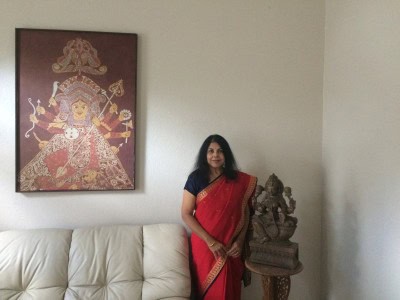 By Sukant Deepak
By Sukant Deepak
New Delhi, Nov 24 : Reading about the Kohinoor diamond and how it was taken by the British from Maharaja Dalip Singh and given to Queen Victoria, writer Chitra Banerjee Divakaruni came across the story of his mother — Queen Jindan. “It was such an inspiring story of courage and resistance, and a great tale of love as well. I figured that, like me, many people did not know of Jindan’s brave spirit and her intelligence — and the wrongs she suffered not just at the hands of the British but also her own treacherous nobles. It had to be shared with the world,” says the author whose latest book ‘The Last Queen will be published by HarperCollins India in January 2021.
Known for works including ‘Palace of Illusions’, ‘Sister of My Heart’, ‘Oleander Girl’, and ‘One Amazing Thing’ have all been optioned to be made into movies or TV serials, Divakaruni’s novels ‘The Mistress of Spices’ and ‘Sister of My Heart’ as well as a short story ‘The Word Love’ have already been adapted into films.
The US based author, who is the McDavid professor of Creative Writing at the University of Houston Creative Writing Program says that working on the historical character meant pain sticking research. “It involved working with books from different libraries and ordering some from India. I especially researched old photographs and paintings of the historical buildings in which Jindan would have lived, such as the Badshahi Qila in Lahore. That was important in order to get a visual sense of these places.”
For someone in whose work women are always at the centre of the world she creates, the choice is intentional. Stressing that for long the woman’s story has been pushed to the edges, she says,”It is important for me to gaze at women’s lives and their thoughts in order to examine why they made certain choices. In ‘The Last Queen’, there may be several important male characters –Ranjit Singh, Dalip Singh, and Ranjit Singh’s Wazir Dhian Singh– but my focus is definitely on Jindan.”
Adding that she likes creating complex characters which do not follow a linear narrative, Divakaruni smiles, ” To me that is the most important part of writing. That was true with Panchaali in ‘Palace of Illusions’ and also Sita in ‘The Forest of Enchantments’, who both had multiple layers and grew and changed as time passed. I hope my male characters — Krishna, Arjun, Karna, Ram, Ravana, etc. also come across as complex.”
Co-founder and former president of ‘Maitri’, a helpline founded in 1991 for South Asian women dealing with domestic abuse, she says that her activism is majorly in two fields — women’s rights and women and child education. “I write more directly about the former–in different ways. Panchaali, Sita and Jindan all speak out against double standards and the mistreatment of women. I hope that if people identify with my heroines and their pain and courage, their attitudes towards how women should be treated will be positively influenced.”
When Divakaruni started writing, in many ways, it was a way of finding herself in an alien culture. She adds, “It helped me to identify myself in that setting. Precisely why I have written many immigrant tales, too, such as in ‘Mistress of Spices’, ‘Queen of Dreams’ and ‘Before We Visit the Goddess’. Immigration has also helped me appreciate many things about my Indian culture (especially tales and myths). I have also made it a point to read more Indian writers since I moved here.”
Quite pleased with how the screen adaptations of her works have turned out, she feels that while the directors followed their own visions, much different from hers, the final products have been satisfactory. ” Suhasini Mani Ratnam, who did a Tamil TV adaptation of ‘Sister of My Heart’, stayed very close to the book, and I particularly appreciated that. Now, ‘Palace of Illusions’ and ‘The Last Queen’ have been optioned. It is very exciting and I look forward to what will happen.”
The author, who started her writing career as a poet and still likes to read verse regularly says now her heart is in fiction. “That is what I spend all my creative energy on.”
Her next work would be either a historical novel, set around Partition time or a novel set in contemporary Kolkata, (her hometown), tracing the unusual adventures of two young women. “Right now, I am researching and making notes about the main characters. I will make a decision in the next month or so.”
–IANS
sukant/rs

